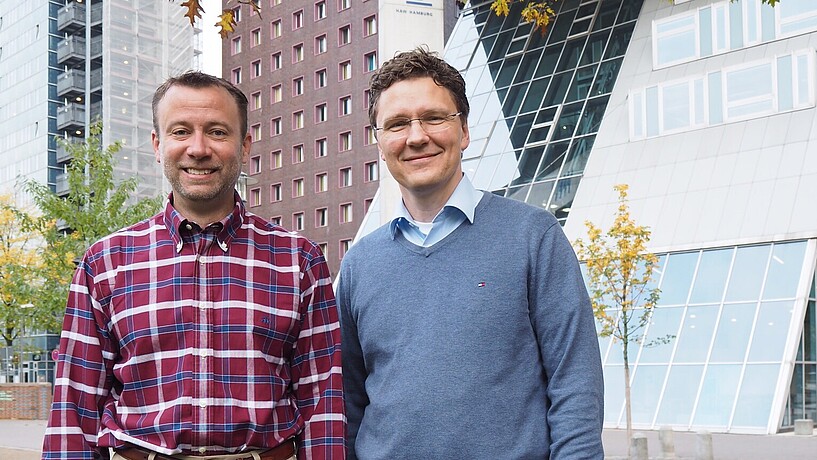‘HAW goes USA’: a visit from Virginia Tech
In the autumn of 2019, the DAAD ISAP project linking HAW Hamburg and its strategic US partner Virginia Tech saw a visit to Hamburg by Prof. Dr. Michael Philen, who spent 14-18 October in the Department of Automotive and Aeronautical Engineering. The purpose of the visit was to advance interactions between academics from the two institutions and enable Master’s degree students to network with Prof. Philen.
In the context of his specific expertise in adaptive structures and smart materials, Professor Philen gave a fascinating guest lecture on adaptive lightweight construction as part of the Master’s course lectures run by the HAW Hamburg professors Dr. Ulrich Huber and Dr. Eckart Nast. His talk revolved around what are called ‘bioinspired’ structures, functionalities found in similar form in the natural world; specifically, the work explained by Professor Philen draws on the movements of worms and molluscs. Professor Huber commented afterwards: ‘It was of great interest to be able to observe how a change of pressure within a pipe, where the fibres are cleverly arranged, makes the structure expand or contract without requiring actuators, drives or articulation. There are potential future uses for this insight in aviation, for adjusting movable components, for example. Harnessing these properties might also enable us to harvest wave energy without needing to use turbines.’ The Master’s students in attendance received the lecture with equal interest, and the Q&A session that followed gave rise to a lively discussion.
One particularly exciting opportunity outlined in these lectures was the chance for students to complete their Master thesis at Virginia Tech under Professor Philen's supervision – this is a new component of the ISAP project, intended to complement the existing exchange of Bachelor’s students with Virginia Tech by enabling Master’s students to also take part. Prof. Markus Linke, who is in charge of the initiative, is confident that ‘this opportunity, alongside strengthening the student exchange scheme between our institutions, will provide springboards for advancing research collaboration on adaptive lightweight construction.’
The first Master’s students are already waiting to inaugurate the scheme. One of them is Daniel Peter, whose stay in Blacksburg is scheduled to commence in March 2020. Explaining his decision to complete his Master thesis at Virginia Tech, he comments: ‘Professor Philen's researchexplores “smart” materials which can be used, for instance, to optimise the aerodynamic properties of a wing. There’s a new approach to designing high-lift systems at the trailing edge, called the Variable Camber Continuous Trailing Edge Flap (VCCTEF), which reduces drag and noise emissions. I’ve gained some experience with aerodynamics in my degree course at HAW Hamburg, and am really interested in contributing to research on these cutting-edge technologies. Virginia Tech has strong research groups and facilities for this area.’
During his week in Hamburg, Professor Philen had the opportunity to meet and network with other academics from his discipline; Professors Markus Linke and Ulrich Huber explained their research in lightweight construction, and Professor Detlef Schulze showed Professor Philen some student projects in the aerodynamics lab. As well as talking about research at HAW Hamburg in general and in its new acoustics lab in particular, Professors Wolfgang Gleine and Dragan Kozulovic took their guest on a tour of Hamburg’s Center of Applied Aeronautical Research (ZAL), showcasing the experimental resources available to HAW Hamburg to aid research into future ways of reducing noise in aircraft cabins. Professor Kozulovic: ‘We were in agreement with our fellow scientist Mike Philen on the need for an interdisciplinary approach if we are to realise the promise of this area of research and development; it is our shared view that our two institutions have distinct and complementary strengths, and both place high value on the direct transfer of research findings into teaching.’
The International Office also met with Professor Philen to discuss Virginia Tech’s new aerospace engineering curriculum and identify opportunities for its students to complete further courses in Hamburg that can count towards their degrees. The medium-term goal is for Virginia Tech students to spend a semester at HAW Hamburg without extending time to graduation back in the US – a ‘Hamburg track’ as an integral part of the curriculum. It was evident that both institutions are open to various possibilities and keen to realise this objective as soon as is practicable.
Mike Philen's overall impression of the warm welcome he got in Hamburg and of his many stimulating discussions with students and academics was a highly positive one. He came away having noted a number of points of intersection with the potential to give rise to productive collaboration between the two institutions. The launch of the Master's exchange programmein 2020 will be a significant step in this direction.
Text: Ingrid Weatherall, October 2019
DAAD ISAP: International Study and Training Partnerships organised by the German Academic Exchange Service (Deutscher Akademischer Austauschdienst). www.daad.de/en/information-services-for-higher-education-institutions/further-information-on-daad-programmes/isap/

